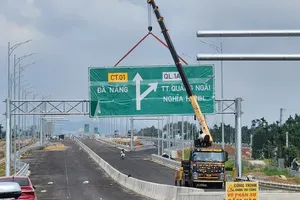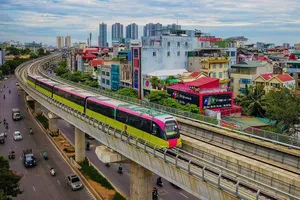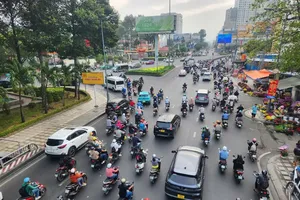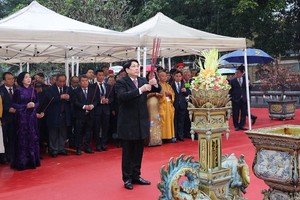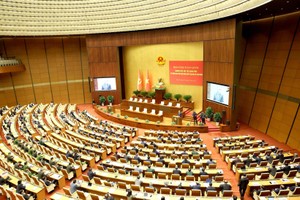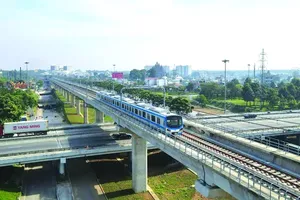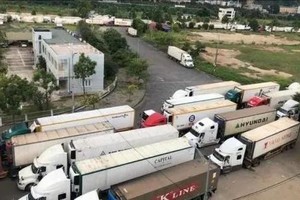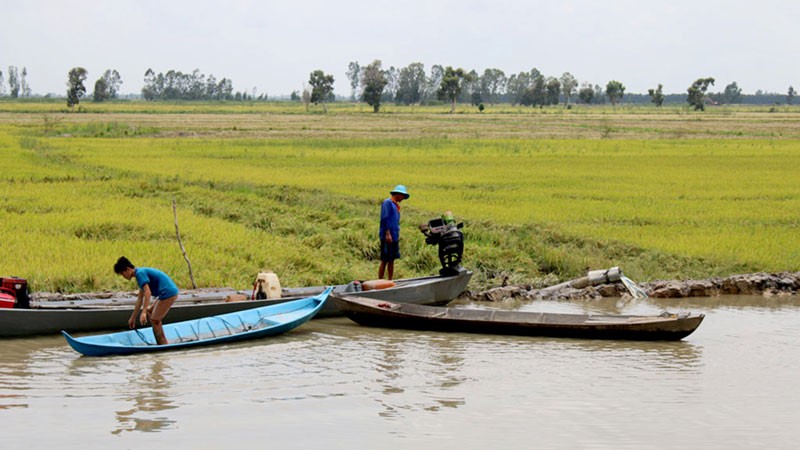
For instance, in the past 17 years, the region has only been able to recruit 6 associate professors. Moreover, each commune and district in the provinces of the Mekong Delta region has medical stations, health centers, and hospitals but hundreds of residents travel from Ca Mau Province to Ho Chi Minh City every day for medical diagnosis and treatment.
Patients seek better medical care in Ho Chi Minh City
On a bus trip from Ca Mau Province to HCMC at midnight in early June 2024, there were over 30 passengers, including many children and elderly people. As soon as the passengers boarded, driver Thanh revealed that many passengers were on their way to HCMC for medical treatment.
He added that more and more residents in Ca Mau Province travel to HCMC for medical examination and treatment. According to him, previously, there were only a few dozen people per day, but now there are hundreds. Explaining the reason for going to HCMC for medical treatment, patient Nguyen Van Huu from Ward 4 of Ca Mau City who was on the bus disclosed that he wanted to be examined in the province’s infirmaries for convenience and to avoid the hassle of traveling far, but he is unsure of local medical workers’ quality.
Doctors and nurses in hospitals in Ca Mau Province failed to diagnose patients’ illnesses, said Mr. Huu. He recounted that he had a friend who had a stomachache five months ago and went to the hospital in Ca Mau City for examination, the doctor diagnosed him with a gastric ulcer and prescribed medication, but it did not work. Two months later, the pain worsened, and the patient went to HCMC for examination and was diagnosed with late-stage stomach cancer. His friend passed away shortly after. The doctor said that if it had been detected earlier, he would not have passed away so quickly.
Old man Huu said that he has had a stomachache for the past few days, and it's difficult for me to get around because he’s old, but he’s still trying to get to HCMC for a checkup to be sure.
According to Deputy Director Tran Quang Khoa of the Ca Mau Provincial Department of Health, over the past time, the province has implemented many solutions, but the medical examination and treatment activities of the local health system have not met the actual needs, mainly due to the shortage of qualified doctors. He pointed out that specialized departments, such as emergency resuscitation, trauma and orthopedics, and neonatology have seen the most serious shortage. In the past three years, both public and private hospitals have been recruiting qualified doctors and nurses, but the number of doctors recruited can be counted on the fingers of one hand.
The shortage of high-quality human resources is not limited to healthcare. In Bac Lieu Province, there is a severe shortage of high-quality human resources in most sectors of the state sector.
Director Tu Minh Phuc of the Bac Lieu Provincial Department of Home Affairs said that recognizing high-quality human resources as the key to development, the province has both trained and retrained incumbent officials and boldly implemented policies to attract university graduates to work after the province's establishment in 1997.
In 2023, Bac Lieu authority also issued a policy to support a one-time payment of VND500 million for people with professor degrees, VND400 million for associate professors, VND300 million for doctors, and VND100 million for people with master's degrees when they come to work in the locality. However, despite the local administration’s efforts to attract talented people, Bac Lieu Province is still seriously lacking qualified workers, especially in the fields of information technology, environment, construction, and healthcare.
The shortage of high-quality human resources is a major obstacle to the development of the Mekong Delta. To address this issue, it is necessary to implement comprehensive measures to attract, train, and retain talent in the region. This includes improving salaries and benefits, providing better working conditions, and creating a more supportive environment for professional development.
According to statistics, out of over 10,000 officials in the province, there are only 27 PhD holders, 750 master’s degree holders, and 40 specialists with a second-level degree. Most of these officials work at the provincial level, with very few at the district and commune levels. Despite the existing shortage, in recent years, the number of highly qualified personnel in Bạc Liêu has been declining. In the healthcare sector alone, more than 100 staff members have left their positions in the past three years.
As of 2007, Tra Vinh Province had no associate professors. Even after 17 years of recruitment, Tra Vinh has only managed to hire six associate professors. Similarly, in the healthcare field, after 17 years of recruitment, the entire province has only 57 specialists with a second-level degree, serving over 1 million people in the area not to mention those in neighboring regions.
Notably, many teachers with university degrees and master’s degrees have left their jobs due to low salaries of around VND 4-5 million per month.
Barriers for growth
Long An Province has still struggled to attract highly qualified labor despite having several advantages over other localities in the Mekong Delta region as it is near Ho Chi Minh City with well-invested infrastructure and the highest number of industrial zones. For instance, the workforce in leadership and management positions within enterprises accounts for only 0.5 percent, and skilled workers make up just 3.17 percent of the total labor force in the province.
A representative from the Department of Labor, Invalids, and Social Affairs in Long An Province acknowledges that while the province has a large labor force, most of it consists of unskilled workers. The shortage of experienced managers and technically proficient personnel remains a significant obstacle, hindering local economic development.
Some foreign direct investment companies operating in Long An Province have even had to relocate to Cu Chi District in Ho Chi Minh City, Binh Duong, or Dong Nai due to difficulties in recruiting personnel who meet their requirements such as proficiency in foreign languages, international investment connections, and human resource management skills.
Despite being less affected by saltwater intrusion and climate change, in recent times, Hau Giang Province has focused on agricultural development and implemented various policies to attract qualified non-local laborers to this sector. However, the proportion of highly educated and skilled workers remains low (only 11 percent have a university degree, and there are no officials with doctoral qualifications).
Director Ngo Minh Long of the Department of Agriculture and Rural Development in Hau Giang Province pointed out that many local officials are unable to meet job requirements due to limited knowledge and expertise. Unfortunately, the workforce engaged in scientific and technological research and application in agricultural processing is scarce, which restricts market access and reduces the value of agricultural products, hindering the overall development of the agricultural industry.
Similarly, the human resources in the agricultural sector in Can Tho City is not much better. Deputy Director Tran Thai Nghiem of the Department of Agriculture and Rural Development in Can Tho City revealed that the city lacks personnel with expertise in agricultural economics, high-tech agricultural applications, information technology, law, and public investment, and those who are good at foreign language to communicate with foreign counterparts.
It makes the transformation process from an agricultural production mindset to the agricultural economy, digitalization, and international integration in the local agricultural sector progress slowly. As transportation infrastructure in the Mekong Delta region becomes more interconnected and numerous seaports are invested in and operational, logistics is expected to play a crucial role in propelling this region forward.
However, according to General Director Vo Thanh Phong of Hau Giang Maritime Services LLC, achieving development goals remains distant due to the shortage of skilled logistics professionals in the region. Not only recent graduates but also experienced individuals with decades of work experience lack strategic thinking, vision, and cohesive operational skills. They struggle to connect supply chains from raw materials to distribution. Consequently, businesses hiring in this field must invest time and resources in retraining. This challenge is a key reason why logistics companies in the Mekong Delta account for less than 5 percent of the national logistics industry.
Can Tho City, one of the two locations with the largest port clusters in the Mekong Delta, has yet to fully assume its role as a logistics hub, fostering connections between different regions due to the scarcity of skilled labor. Each year, nearly 20 million tons of goods in the Mekong Delta are transported to the Southeast region for export and processing, bypassing the ports in Can Tho.
According to the General Statistics Office, the proportion of trained laborers in the Mekong Delta stands at only 15 percent, the lowest nationwide and 12 percent below the national average. Therefore, in comparison to other key economic regions like the Red River Delta, North Central, and Southeast, the disparity is significant; for instance, the Red River Delta has 37.1 percent, the North Central has 26.7 percent, and the Southeast has 28.2 percent.


